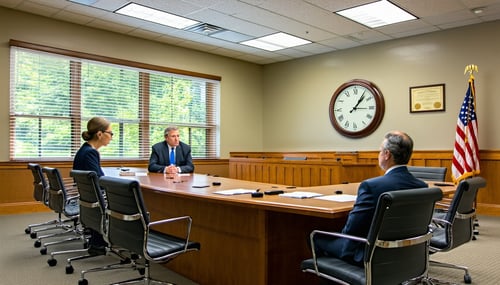If you're pursuing a property tax appeal in Clayton County, Georgia, and your initial appeal to the Board of Assessors doesn't produce the desired outcome, your case may proceed to a Hearing Officer. Understanding the role and responsibilities of the Hearing Officer is critical for preparing your case effectively at this stage.

This guide explains who the Hearing Officer is, how they fit into the appeals process, and what to expect during the hearing.
✅ Eligibility for Hearing Officer Appeals
The option to appeal to a Hearing Officer is limited to:
-
Non-homestead real property with a fair market value greater than $500,000
-
Wireless property disputes (one or more accounts) with an aggregate FMV above $500,000
Note: Homestead properties and lower-value properties are not eligible for this appeal route.
⚖️ Grounds for Appeal
When choosing the Hearing Officer option, you may only appeal based on:
-
Value (i.e., market value is incorrect)
-
Uniformity (i.e., your property is not assessed fairly compared to similar properties)
Other issues, such as:
-
Taxability
-
Denial of exemptions
…must be appealed to the Superior Court, not a Hearing Officer.
📋 Appeal Process Overview
1. File Initial Appeal
-
Submit a written appeal to the Clayton County Board of Assessors (BOA) within 45 days of the date on your Annual Notice of Assessment
-
Select the “Hearing Officer” option on the appeal form (PT-311A)
2. BOA Review
-
The Board of Assessors has up to 90 days to review your appeal and issue a response.
3. Taxpayer Response
-
If you disagree with their decision, you have 30 days to notify the BOA in writing.
4. Referral to Superior Court Clerk
-
The BOA then has 30 days to refer the case to the Clerk of Superior Court, who will schedule a hearing.
5. Hearing Officer Appointment
-
The Clerk oversees appointing a qualified Hearing Officer
-
If a Hearing Officer cannot be found, the case will revert to the Board of Equalization (BOE) for hearing.
🏅 Qualifications of a Hearing Officer
A Hearing Officer must:
-
Be a state-certified general or residential real property appraiser
-
Be approved by the Georgia Real Estate Commission and the Georgia Real Estate Appraisers Board
-
Attend required training at their own expense
This ensures that your case is evaluated by a professional with the appropriate background in real estate valuation.
🧑⚖️ What Happens During the Hearing
-
A formal hearing is conducted, usually at the courthouse or another official venue
-
Both you (the property owner) and the Assessor’s Office may present:
-
Evidence
-
Testimony
-
Appraisals or comparable sales
-
-
The focus is strictly on value and uniformity
📢 Decision
-
The Hearing Officer will typically announce their decision verbally at the hearing’s conclusion
-
A written decision will follow
💵 Cost
-
The Hearing Officer is paid a minimum of $25 per hour
-
Payment is handled by the Clayton County Governing Authority, not the property owner
⚖️ Further Appeal
-
Either party (you or the BOA) may appeal the Hearing Officer’s decision to Superior Court
-
This must be done within 30 days of the decision
✅ Advantages of the Hearing Officer Option
-
Your appeal is heard by a qualified, state-certified appraiser
-
Hearings are more focused than the Board of Equalization
-
Professional valuation expertise is applied directly to your case
⚠️ Disadvantages and Limitations
-
Eligibility is restricted to high-value, non-homestead or wireless properties
-
Appeal grounds are limited to value and uniformity
-
If a Hearing Officer isn’t available, your appeal defaults to the BOE
📝 Final Tip
Before choosing this option, verify your property’s eligibility and ensure your appeal is based strictly on value or uniformity—not exemption or taxability concerns. Strong evidence (e.g., appraisals, recent comparable sales) is essential to succeed.
📚 Resources – Clayton County, Georgia
-
🧾 Clayton County Tax Commissioner’s Office
Website: https://www.claytoncountytax.com/
Phone: (770) 477-3311 -
🏠 Clayton County Board of Assessors
Appeal information and property records
Website: https://assessors.claytoncountyga.gov/
Phone: (770) 477-3285 -
📄 Georgia PT-311A Appeal Form
https://dor.georgia.gov/documents/property-tax-appeal-assessment-form-pt311a -
⚖️ Georgia Department of Revenue – Property Tax Information
https://dor.georgia.gov/property-tax -
📘 O.C.G.A. § 48-5-311 – Appeals Procedures (Official Georgia Code)
https://law.justia.com/codes/georgia/2024/title-48/chapter-5/section-48-5-311/



